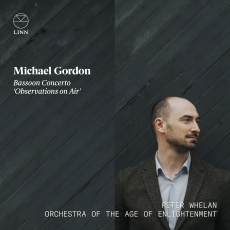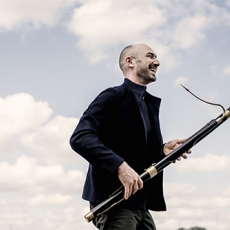Peter Whelan & OAE - Michael Gordon: Bassoon Concerto "Observations on Air" - Classical Source
But at almost the same time in 1765, scientist Joseph Priestly (the discoverer of oxygen, and the first proposer of such a thing as an ecosystem, let alone the inventor of soda water) was joining his great friend Benjamin Franklin at the Club of Honest Whigs, which James Boswell described. “It meets every other Thursday at St Paul’s Coffee-house. It consists of clergymen, physicians and several other professions… We have wine and punch upon the table. Some of us smoke a pipe, conversation goes on pretty formally, sometimes sensibly and sometimes furiously. At nine there is a sideboard of Welsh rabbits and apple-puffs, porter and beer. Our reckoning is about eighteen pence a head” (quoted in George Goodwin’s Benjamin Franklin in London, Weidenfeld & Nicholson, 2016, page 98).
It is just such a convivial atmosphere that Michael Gordon cites as his inspiration for his bassoon concerto, entitled – directly after Priestly – Observations on Air. Obviously air is integral to the nature of wind instruments (and brass for that matter), but the music-making at this concert, played before the plain-glass of St John’s main window through which the cloudless sky gently turned towards sunset, seemed as natural as breathing. The over-riding title – “Winds of Change” –not only alluded to the Enlightenment itself and the two concerto instruments but also, in practice, to the requirements of each piece, as no two works needed the same line-up, with only a pair of horns common to all.
And so to the new work. Michael Gordon is perhaps best known for his association with the New York ensemble Bang on a Can. He brought what might be regarded as trademark minimalism to Priestly, Franklin, and the Club of Honest Whigs, with the music propelled forward by double-bass chugging, which set the strings off in repeated patterns, over which Peter Whelan coloured the music with a succession of stately descending phrases. The timbre of a ‘period’ bassoon is softer than its modern counterpart, somehow warmer and more comforting, even when Whelan forces the note to give it a tremulous edge as in the midpoint of this opening movement.
Curiously Gordon’s programme advice omitted to inform that Observations on Air is in the standard three-movement form, so the end of the first movement was greeted with generous applause. The soloist’s trajectory is reversed in the central movement, rising upwards (still at steady pace) against ominous swelling growls from violas, cellos and double basses. Only in the Finale do we get arpeggiated virtuosity, perhaps illustrating the more heated parts of an evening at “St Paul’s Coffee-house”, the participants gulping in newly-discovered oxygen to debate even more.
Michael Gordon was on hand to receive acclamation with Peter Whelan, who – a nice touch – received a bouquet from fellow-bassoonist Andrew Watts who had not been required (only flutes, oboes and horns).


